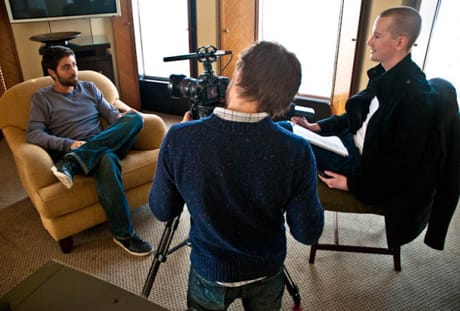The very idea of Austin Visschedyk, a 13-year-old paparazzo, sounds like a joke; he's less a person than a walking symbol of society's obsession with fame. Someone like Paris Hilton is also a symbol ― of a certain kind of famous-for-being-famous celebrity. Hilton so frequently hovers around Teenage Paparazzo, Entourage star Adrian Grenier's documentary about Visschedyk ― stepping out of limos, exiting nightclubs, chatting with Grenier in interview segments ― that whenever she and Visschedyk appear on screen together, one fears how rapidly the cultural cancer could spread through the theatre.
Ah, but there I go getting judgmental. Adrian Grenier is, of course, a celebrity, and he isn't shy about saying that he doesn't appreciate paparazzi, but Teenage Paparazzo is an admirably level-headed film about celebrity culture, and ambitious in the number of topics it broaches. Matt Damon and Lindsay Lohan (!) are on hand to complain about the paparazzi's invasiveness, while Hilton and Lewis Black cheerfully accept it as a fact of life. Pop psychologists discuss our compulsion to want to know celebrities personally while also rooting for them to fall. We even hear Rosie O'Donnell talk disapprovingly about the sham lives stars create for the media. Not a bad observation; it's not like she ever made a big deal about having a "crush" on Tom Cruise or anything.
These points aren't exactly new, but Teenage Paparazzi earns a lot of interest, as well as a current of unpredictability, from having a celebrity at the helm. There are laughs to be had when Grenier poses as a paparazzo to get Brooke Shields' picture, or when he has a nightclub outing with Paris Hilton, which ends up on the gossip websites the next day. We also see him patiently signing autographs and posing for pictures with fans, who are happy to tell him, "This is gonna get me so much ass on Facebook." He is sensibly ambivalent about the role the paparazzi play in his life: when one interviewee asks him point-black why he is making a documentary about a subject he doesn't want to support, he can barely muster an answer.
Grenier has a tendency to hammer home his points, particularly in his voiceover narration: "This was no longer about paparazzi; Austin wanted fame for himself. But something about it made me uneasy. Perhaps it was from my own experience." Still, he keeps things moving at a rapid pace and he knows how to generate surprise. At the beginning, Visschedyk is something of a leech, calling Hilton "one of my best friends" to Hilton's driver (when trying to talk his way into a photo op) and, more frequently, to the teenage girls he picks up.
By the end, he's become a pseudo-celebrity himself, with Grenier having to compete with other film crews for interview time. If that doesn't make you feel uncomfortable about celebrity culture, I don't know what will.
(Mongrel Media)Ah, but there I go getting judgmental. Adrian Grenier is, of course, a celebrity, and he isn't shy about saying that he doesn't appreciate paparazzi, but Teenage Paparazzo is an admirably level-headed film about celebrity culture, and ambitious in the number of topics it broaches. Matt Damon and Lindsay Lohan (!) are on hand to complain about the paparazzi's invasiveness, while Hilton and Lewis Black cheerfully accept it as a fact of life. Pop psychologists discuss our compulsion to want to know celebrities personally while also rooting for them to fall. We even hear Rosie O'Donnell talk disapprovingly about the sham lives stars create for the media. Not a bad observation; it's not like she ever made a big deal about having a "crush" on Tom Cruise or anything.
These points aren't exactly new, but Teenage Paparazzi earns a lot of interest, as well as a current of unpredictability, from having a celebrity at the helm. There are laughs to be had when Grenier poses as a paparazzo to get Brooke Shields' picture, or when he has a nightclub outing with Paris Hilton, which ends up on the gossip websites the next day. We also see him patiently signing autographs and posing for pictures with fans, who are happy to tell him, "This is gonna get me so much ass on Facebook." He is sensibly ambivalent about the role the paparazzi play in his life: when one interviewee asks him point-black why he is making a documentary about a subject he doesn't want to support, he can barely muster an answer.
Grenier has a tendency to hammer home his points, particularly in his voiceover narration: "This was no longer about paparazzi; Austin wanted fame for himself. But something about it made me uneasy. Perhaps it was from my own experience." Still, he keeps things moving at a rapid pace and he knows how to generate surprise. At the beginning, Visschedyk is something of a leech, calling Hilton "one of my best friends" to Hilton's driver (when trying to talk his way into a photo op) and, more frequently, to the teenage girls he picks up.
By the end, he's become a pseudo-celebrity himself, with Grenier having to compete with other film crews for interview time. If that doesn't make you feel uncomfortable about celebrity culture, I don't know what will.
